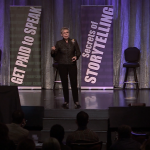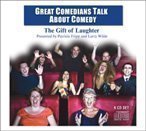

Are your presentations lacking humor?
The late John Kinde is remembered as a comedy mentor for many. Know for his skill with observational humor claimed his most frequently-asked question was, “How do I get to be funny?”
After delivering a fun-filled, brilliantly-crafted presentation, an audience member referred to his Observational Humor monologue. “You certainly have the gift of humor.” John’s response: “For me, the skill is 100% learned.”
This is how John explained how he became funny, and you could as well.
In my case, the gift of humor did not fall from the heavens. I was not born with a special humor gene. I did not hit my head and wake up the next morning as a stand-up comic. There was no magic pill.
It started with a commitment to learning the skill of being consistently funny. My Toastmasters club, when I first made that commitment, did not have an Observational Humor segment. I didn’t have a mentor. There was nobody in my club who was exceptionally funny. I had never won a humorous speech contest. I didn’t have any humor books in my personal library. But I knew what I wanted to do.
I decided that, by the end of each meeting, I wanted to be able to come up with one funny line which I would create during the meeting. And with that commitment, I became known as someone who easily saw the humor in everything. Someone with the gift of humor.
If I can learn to be funny, anybody can.
I totally believe that if you make the commitment to learn the skills, and have the focus and discipline to be funny…you can do it. Yes, it’s been 33 years since I stepped onto the path of learning to be funny. If you haven’t done the math, I started on my humor journey in 1979.
Since then, I’ve done many things to develop my skills. But the good news is that I went from being a totally un-funny guy to someone with the reputation of being consistently very funny in just one year.
Is it true that you need some natural talent to become really funny?
In my opinion, no. While natural talent is nice to have, it’s not mandatory. What you do need, besides commitment, is NOT to be humor challenged. If you wanted to learn to play an instrument or sing, and you are tone-deaf, it might be a big challenge for you to excel in music. If you are color blind, it might be difficult for you to become a skilled artist. Likewise, if you were humor-challenged, becoming a person with the reputation of being really funny might not be possible. The good news is if you humor challenged, is a person who is part of a very small minority group. It’s unlikely that you are a humor-challenged person. In fact, the opposite is more likely. You probably have some natural humor skills…more than I had when I started out.
We have been featuring an Observational Humor segment as part of our Toastmasters club meetings for several years.
In that time we’ve had about six people who have learned to present consistently-funny Observational Humor monologues by the end of the meeting. To that, add another 10 members who are now able to regularly create at least one excellent humorous observation. The skill can be learned. I’ll say it again, natural talent is nice, but not mandatory.
But you say that your club doesn’t have an Observational Humor segment as part of its meeting. That doesn’t matter. When you have a meeting role where you have a chance to speak in the second half of the meeting, commit to opening your comments with one piece of observational humor. Just one line, not a whole monologue.
With 33 year’s effort, I became an overnight success. Most exciting is that I made a lot of progress in my first year.
Here’s how you can get started. At your next Toastmasters club meeting bring a clipboard or a notepad. If you are not a Toastmaster, apply this procedure to your business networking group, your civic club, your next board meeting, or an activity where you are able to say a few words. Commit yourself to create one Observational Humor line by the end of the meeting.
At the start of every meeting, I sit with my blank clipboard reminding me that I have a job to do. I force myself to look for possible humorous connections. If I see or hear something that happens during the meeting, I write it down if I think it has humor possibilities. Maybe I can’t see a humor connection immediately. Maybe I’ll never use it. But eventually, a connection may pop into my head. And I’ll play with it. Massage it. Tighten the wording. And finally, decide on a line that I’ll try on the group. It may or may not be funny. That’s part of the learning process.
What I’ve learned is that the humor skill comes with the focus, discipline, and commitment to look for the connections.
If I’m not sitting there with my blank clipboard, humor ideas do not rain down from the sky. It’s my focus and intention which seed the clouds of creativity and get the humor process rolling.
Your goal, when starting out, is to create just one line. A year from now you’ll likely be doing better than that. I’m usually able to come up with an eight-joke monologue by the end of a typical 90-minute club meeting. But remember, that’s with 33 years of practice.
Start today. You’ll be on the path to becoming one of the humor-gifted members of your club. And you’ll have the fun of adding fresh humor to your talks.
Thank you to John Kinde. Anyone who remembers him knows what a kind, generous person. When John was alive this article was used with his permission. Perhaps you will be inspired by his journey.
Want to be funnier? Checkout what LarryWilde learned from The Great Commedians.

Companies that want to drive sales and gain a competitive edge hire Patricia Fripp to help them improve their important conversations and presentations. Kiplinger’s Personal Finance wrote, “One of the best ways to invest in success is to learn presentation skills from Patricia Fripp.” Fripp was named one of the “Top 25 Women in Sales” and is among the “Top 30 Coaching Gurus.”

I read this with interest. I am lucky enough to enjoy an easy and natural sense of humour and can see the funny side of almost anything. I will recommend this article to a writer friend of mine who keeps telling me she wants to write humorously, but can’t. Actually, she has a great sense of humour, so I guess she just needs to learn to transpose it into words. The idea of training the ‘humour skill’ is a new one to me, but I am glad to see that it is possible. It gives me hope that I might be able to train my non-existent math(s)skills.
I am also a firm believer that in order to be insanely good in any audience we need to inject every dose of humour into our speeches whenever and wherever we relish and cherish the moment to speak.
To me if we could hone that moment to a shine humouring the audience we would be just like the doctor donning the hat of the surgeon holding the audience in stitches.Just remember humout them but don’t “Tumuor” clinically